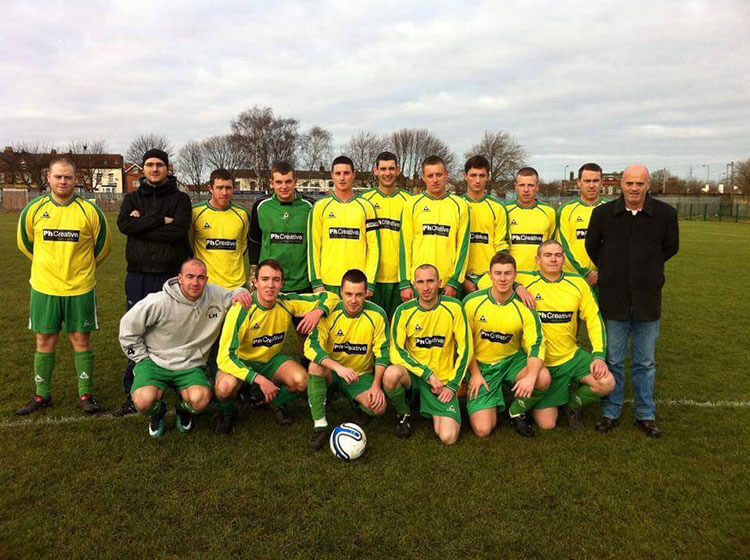You want my advice? I'm tempted to say don't do it.
It's hard graft isn't it!
It is hard graft, but I loved it. And although there were more downs than ups, I’ve learnt a lot. I was a Sunday League Manager for over 8 years until I called it a day recently. This is my opinion based on my experiences which I’ve taken into my professional career and vice versa. Others will have different ideas. So take it or leave it…
The League
I’ve managed under two different leagues. The major pain was the monthly league meeting which lasted around 20-60 minutes. My aim was to just collect the fixtures for the month. The league committees aim was to put me to sleep. With their repetitive reminder about ringing them with the final score after your game. And not to abuse referees. They do a good job to be fair though.
Every Tuesday, if you are the home team you have to ring the referee with a courtesy call. Then ring the opposition to confirm the game and what colours you’ll be playing in.
Some managers leave it till Saturday afternoon to call you if you are the away team. The league committee encourages you to ring the league of a Wednesday if your opposition haven’t rang. So you could ‘claim the points’. It’s not something I ever did but I’d heard teams had claimed in the past.
When Thursday night came around I’d text every player. I used a group app to text everyone the fixture details. Who we were playing, where, when and remind them about subs.
I’d ask for a reply of either IN or OUT so I knew if we had a team and begin thinking about who would start. I used the Notes app on my phone to keep a log. I often had to chase one or two who’d forget to reply or were ‘credit meffs’.
Money, money, money…
Without it you don’t have a club. Simple as that. Expenditure per season was around £2.5k. From affiliation fees, pitch fees, kit and equipment costs, referee fees and fines.
I used TeamStats to manage the finances. I also kept a subs book and recorded every game of who did and didn’t pay. I didn’t let anyone get away without paying. I charged £5 per game. £1 of that went on a spot the ball card so the lads had a chance to win their money back and 33% went into the club kitty.
Some leagues actually charge a fee to join their league. No wonder grassroots football is dying. It’s so expensive. My aim was to finish the season with a couple of hundred quid in the kitty. So bills could be paid for the next season before a ball was kicked.
To start a season I collected £20 per player to sign on. I usually signed around 20 players. The money collected wasn’t even enough to cover pitch fees. The council charged us £600 a season. I think every player thought I was ripping them off. I was running a tight ship that’s all. Keeping us above water.
Players
Managing players is difficult. Finding them is even more so. Especially finding good ones. And when you do they usually come with baggage.
I was lucky to play alongside someone I now regard as a good friend who knew every player for every team in the city. He’d always be ringing me saying “wait till you see who I’ve got for us. He’s quality”. More often than not, they weren’t. But he brought players to the club and helped keep the club alive. He was a true ‘clubman’ and was a great laugh in the dress room. You need players like that.
One of the main reasons I did all this was for the banter with the lads.
Training
All players ask for it. Especially after a defeat. “We need to start training together!” So you organise training, everyone turns up the first week but by the time you get to the 3rd week you’re down to 6 men and you end up cancelling it again.
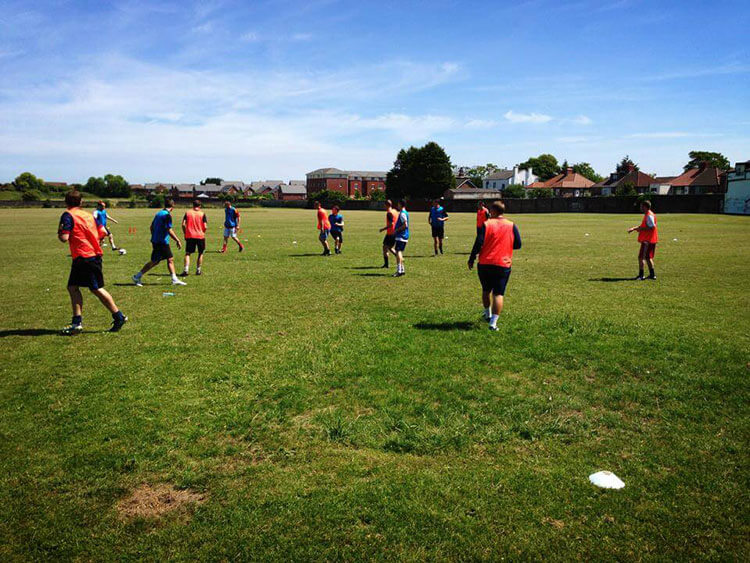
Match Day
I always asked the lads to turn up 45 minutes before KO. There was always one or two who’d ring to say they’re running late and to “save me a kit”.
The worst is your phone ringing nonstop from around 8:30am onwards. Players asking “what time we meeting, what times KO, will we have enough players, is it still on?” Or “I’ve been out all night Jimmy so I won’t be there”. What I hated most was a player saying they’re coming and not turning up. Then not even contacting you with an apology and turning up the next week expecting to start.
If the weather was against us then we’d have to wait for the referee to turn up to tell us if the match is going ahead or not after a pitch inspection.
Your head would be splitting with your team standing around you saying “this better be on!… What’s the ref said? Is the ref here yet? Give him a ring… He should have been here at 6am checking the pitch so I could stay in bed”.
The Kit
The lads couldn’t wait to get in the dressing room and get the kits out the bag.
While you’re filling up the water bottles everyone’s raiding the kit bag for their favourite shirt number. Some were more concerned on how they looked rather than how they played.
When someone would moan about them I felt like strangling them. “Have you had these in the dryer? They’ve shrunk!”
I washed the kit every week. It drove my wife insane with dirty smelly kits around the house. It took up at least 2 hours of my time a week. And they couldn’t even be bothered to put the kits back in the bag after the match. I was like their mother in their bedroom picking dirty washing off the floor.
They’d wrap their soaking wet socks into a ball and leave their sock tape still around them. I had to prize them apart to put them into the washing machine, mud flying everywhere.
The team always wanted a new kit every season. You need a home and away kit to avoid kit clashes with the opposition. I would buy the good stuff so they wouldn’t fall apart after a few games and washes. Buying 15 full kits with numbers printed on the shirts would cost around £400 a kit. When shirts and shorts went missing I’d be fuming. Then one of the lads would turn up the following week wearing the shorts with nothing to change into afterwards.
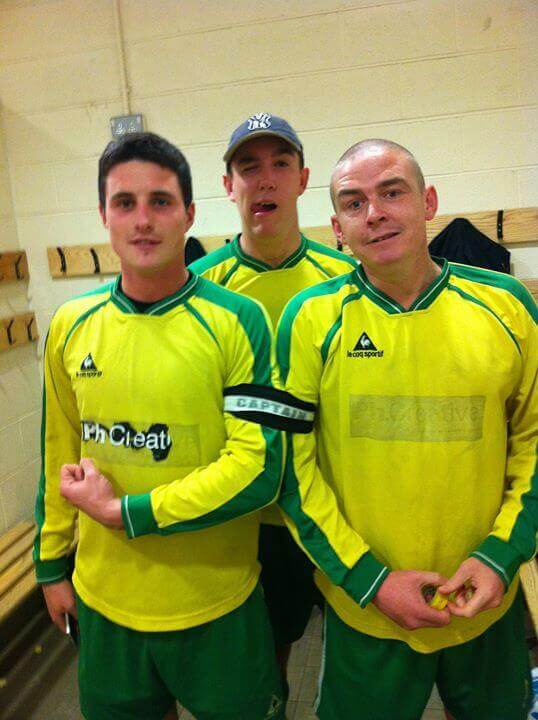
Nets
Ask any Sunday league manager. Getting nets up and down is a nightmare. It would be the same every week.
I’d see players completely avoid the responsibility and then stand there booting the ball in the net. While the ones who’ve volunteered struggle to clip the net on because balls are flying at them.
I created a nets rota.
In the back of my subs book I listed every player and put a tick next to them every time they had put a net up. I’d pick four names who’d done it the least and ask them in two pairs to put the nets up as well as take them down after the game.
I would put the corner flags up myself. It gave me the opportunity to inspect the pitch as well as think about the starting eleven I was about to name.
Usually when the nets where taken down they’d forget the tent pegs holding it down. They’d then lash the nets on the changing room floor instead of putting them in the net bag.
I’d have to take regular trips to the camping shop to buy more tent pegs. All to avoid the referee saying “that net needs fixing before I KO”.
How they put the nets up was usually a joke. I may have a bit of OCD when it comes to nets but to me it’s just common sense. Ensure its tight, secure and straight. It’s not rocket science.
Starting Line-up
I used a great little app called Lineup11 to help.
Picking a starting line-up was sometimes easy as it picked itself due to only having the bare 11.
You worried about what might happen when your right winger, whose knee has been strapped up like he’s come out of surgery, hobbles off at half time. Hardly any of the team had 90 minutes in the tank.
It was really difficult when you had 18 players so you knew 4 players wouldn’t be even getting on the pitch. Usually one of these would put a full kit on and then your captain would be asking for shorts.
I hardly ever picked the best team. My choice was based on the previous result. If we won last week I tried to not change the team. Even if that meant your best player had returned from a 2 week 18-30s holiday.
I tried to be as fair as possible. Most disagreed with my decisions but it didn’t seem fair to drop someone who’d been there every week.
I always named the team 20 minutes before KO if possible. This would give those starting the chance to warm up. It also gave me time to apologise to those not starting and explain the reasons why. No one likes sitting on the bench.
Collecting subs to play was like a loan shark at your door. “Have you got your subs mate?”, “They’re in the car Jim, I’ll pass you them after the game”. They never did. I’d get to the car park after the game only to see them zooming off in their motor. “Can I give you double next week?”, “you already owe three weeks!”
Formations
I tried several formations out.
4-1-4-1 worked well when up against top of the league. But your lone striker up top would complain all game of having no support or not getting a touch. Stick to 4-4-2. But ensure you have 2 good centre midfielders else the opposition will dominate possession. 4-3-3 just gets complicated. And when it gets to around 70 minutes on the clock, tired legs means no one’s chasing back to defend. You end up with 6 strikers and 4 defenders screaming “where’s the midfield?”
Substitutes
I tried not to stand too close to the bench during the game.
The substitutes on the bench would commentate and criticise their team mates for the whole duration. The negativity would drive me insane. Everyone thought they could do a better job on the pitch and a better job at managing. “I don’t know why he’s starting before me…” - Probably because you’ve not been here the last two weeks and haven’t even brought money with you.
Then there were strangers on the side-line. Players’ mates. If a fight broke out on the pitch they’d be the first to run on and jump in. It’s your responsibility as the manager to control the side-line… Every man and his dog.
The Team Talk
Was pretty pointless. Why? Because they didn’t listen.
I’d call the lads into a circle, ask for everyone’s attention and try and give instructions of how I wanted them to play. I tried to be positive. It wasn’t easy. Especially when we’d been beat 6-2 the week before.
The majority would completely ignore you. I’d ask them to keep the ball and let the opposition chase it. Don’t take risks at the back and take a shot.
I’d then name the starting 11 only for one of the lads to come up and ask “where am I playing?” … I’d then smell lasts nights party on their breath and question whether if I’d made a mistake starting them. “I’m sound Jim, honest”.
Warm Up
I’d instruct the captain to get the lads warmed up. It was a small responsibility for wearing the armband.
Even this simple exercise couldn’t be executed. Jogging from one side of the pitch to the other in one straight line together. There were always a few lazy buggers who’d avoid the warm up all together.
Instead, they’d finish their bacon butty from the food van then have a quick smoke before the ref blew to start.
Once they’d stretched out they’d then wander off towards our goal to practice corners and shots from distance. All pointless because they’d never be given that much time or space in the box.
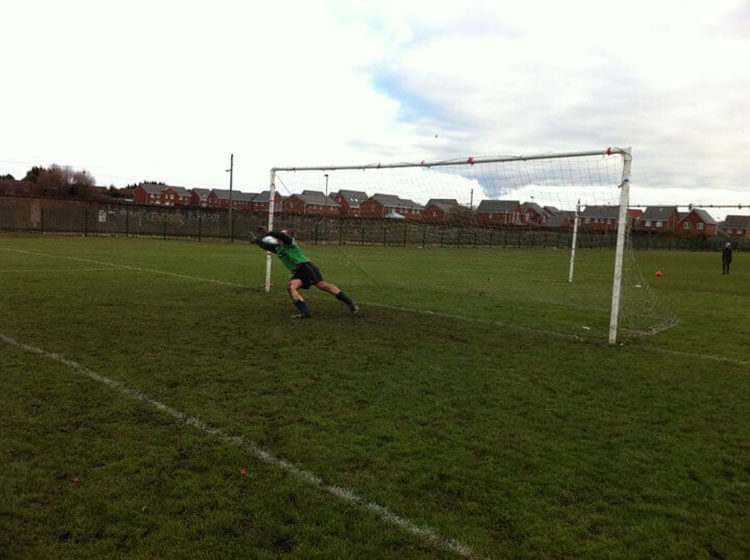
The Referee
Kicking off the match is what the whole weeks preparation was for. You’d shake hands with the ref and he’d give you one of his flags. It’s now your responsibility to signal the ball going out.
You’d signal who the thrown in was for but the ref can override you. If you awarded it to your team and the opposition disagreed you’re met with a mass amount of abuse from some idiot.
It was worse when you gave it to the opposition and your own team would question your loyalty.
I tried to avoid giving the ref abuse as I’d refereed games myself. But when a ref is dictating/spoiling the game sometimes you can’t help yourself. But without them we have no game.
Injuries
You need to have a first-aider on your side line as well as a first-aid kit in your bag. Especially if you’re a FA Charter Standard club.
I had to take a first aid course with the County FA. I never had to put these skills to the test. Although my keeper once broke his jaw in a friendly which was pretty traumatic. Most injuries were either jarred ankles or hamstrings.
You also need insurance too. But unless you pay for a premium package you’re not going to get a pay-out unless a player dies.
Having half your key players out is frustrating but you just have to get on with it.
I’d often find the first-aid kit open with the contents spread out. Either all over the changing room floor or at the side of the pitch. All because someone didn’t have sock tape and wanted to make some out of bandages to keep their socks up.
Half Time
Water at the ready. (I once did oranges for a season too until someone said “why you wasting our money on fruit?”)
This gave me 3 minutes to tell the lads what I was seeing from the side-line and what we needed to improve on. Just like the team talk an hour ago, this was also pointless.
When a member of the team talked over me I found it disrespectful. I had to restrain myself from doing something I’d regret with the refs flag when a stranger on the side-line butted in with their two pence worth.
Making wholesale changes at half time was always a bad idea. Unless we had injuries.
Full Time
When you won it was a great feeling. You didn’t have any nails left after seeing your team grind out a 3-2 victory. I tried to be as gracious as possible and save the celebrations till I got back to the changing room. When you lost you just wanted to go straight home… And quit.
Leaving the Ground
Someone always left their coat or even their boots and expected you to pick them up for them. Carrying a heavy bag of wet kits, nets, bottles and corner flags was a back breaker. I was lucky if someone helped.
Before I left I had to see the referee with the team sheets and pay him for his service. Questioning every poor decision he made and beg him not to put the bookings through to the FA. By this time everyone else has left.
Back the Boozer
Most clubs have a pub to support them. In all my time of running clubs I never received a penny from a pub. But they did put food on for us now and then.
If we’d won then there was a great atmosphere. Everyone wanted to talk through the match and pat each other on the back. We’d also rip into each about mistakes made or funny shouts we’d heard during the game.
If we lost then hardly anyone wanted to go back. We’d end up with three of us sitting in the corner with about 20 hot dogs to get through in silence.
Report the Score
My job wasn’t over. Two hours after the game I had to ring the league with the result. Giving the names of each scorer so they could update their records. They’d also send the information to the local newspaper.
Monday Morning Blues
Depending on what the result was would dictate your mood for the next few days.
I’d receive notifications from the County FA from the match the week before for fines (yellow/red cards). Cheers ref! That’s money we don’t have and now our goalkeeper faces suspension for the next 3 fixtures. He didn’t mean to call you all those mean names!
I’d also have to update the club website with the match result and stats plus who has and hasn’t paid subs. This helped keep a record on player stats which made it easy to pick the winners of awards for the end of season presentation night.
Trophies
This was the best bit of the season for me. Giving recognition for those who’d stuck with you all season.
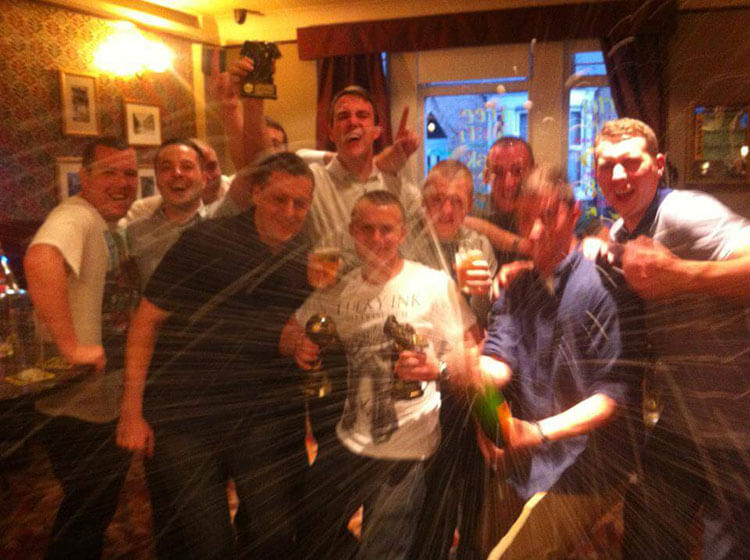
Managers’ player, players’ player, most goals, most assists, best goal… Not forgetting ‘most improved’ which was just an insult/joke.
I’d buy the trophies and arrange the whole night. Usually in the pub, although I held it twice at my work offices. This meant we could have quite when needed and could store the trophies before heading into town for a mad one. Don’t ever book a meal. Everyone has their tea before they come out and they just want to get smashed.
The party isn’t over
While the lads are getting over their hangovers I had to attend the end of season league meeting. The league committee made out its going to be a night to remember. All I remember was having to buy 2 tickets for £50, listen to a poor comedian, eat a cold roast dinner and watch the division champions enjoy themselves receiving their trophies.
When the season finally finished I took a two month break and then pre-season had to be arranged. New players have to be found, friendlies have to be played and bills have to be paid. And it starts all over again.
To all you Sunday league managers out there, I salute you!
- It's hard work
- It takes up a lot of time
- It's a lonely job
- You don't get any thanks
- It costs a lot of money
- Everyone can do a better job than you
- It dictates your mood for the week
You’re probably questioning why do you love it then? I just did.
The lads, the banter, the football. I got to let off steam screaming at the lads to get back and defend. I managed so many players, different characters, made some good friends. All that helped me in some way or another with my own confidence and leadership.
If you’re a Sunday League Manager, associated with a team or you’re thinking about starting a club then please share this post.
Want to know more?
Read about how I became a Sunday League Football Manager.
 Jim Taylor
Jim Taylor